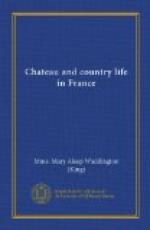Later, during the armistice and Prussian occupation, there were soldiers quartered all around the chateau, and, of course, there were many distressing scenes. All our little village of Louvry, near our farm, had taken itself off to the woods. They were quite safe there, as the Prussians never came into the woods on account of the sharpshooters. W. said their camp was comfortable enough—they had all their household utensils, beds, blankets, donkeys, and goats, and could make fires in the clearing in the middle of the woods. They were mostly women and children, only a very few old men and young boys left. The poor things were terrified by the Germans and Bismarck, of whom they had made themselves an extraordinary picture. “Monsieur sait que Bismarck tue tous les enfants pour qu’il n’y ait plus de Francais.” (Monsieur knows that Bismarck kills all the children so that there shall be no more French.) The boys kept W. in a fever. They had got some old guns, and were always hovering about on the edge of the wood, trying to have a shot at a German. He was very uncomfortable himself at one time during the armistice, for he was sending off parties of recruits to join one of the big corps d’armee in the neighbourhood, and they all passed at the chateau to get their money and feuille de route, which was signed by him. He sent them off in small bands of four or five, always through the woods, with a line to various keepers and farmers along the route, who could be trusted, and would help them to get on and find their way. Of course, if anyone of them had been taken with W.’s signature and recommendation on him, the Germans would have made short work of W., which he was quite aware of; so every night for weeks his big black Irish horse Paddy was saddled and tied to a certain tree in one of the narrow alleys of the big park—the branches so thick and low that it was difficult to pass in broad daylight, and at night impossible, except for him who knew every inch of the ground. With five minutes’ start, if the alarm had been given, he could have got away into his own woods, where he knew no one would follow him.
Hubert, the old coachman, used often to talk to me about all that troubled time. When the weather was dark and stormy he used to stay himself half the night, starting at every sound, and there are so many sounds in the woods at night, all sorts of wild birds and little animals that one never hears in the daytime—sometimes a rabbit would dart out of a hole and whisk round a corner; sometimes a big buse (sort of eagle) would fly out of a tree with great flapping of wings; occasionally a wild-cat with bright-green eyes would come stealthily along and then make a flying leap over the bushes. His nerves were so unstrung that every noise seemed a danger, and he had visions of Germans lying in ambush in the woods, waiting to pounce upon W. if he should appear. He said Paddy was so wise, seemed to know that he must be perfectly quiet, never kicked nor snorted.




